Best Poetry Books 2019 Uk
Poetry Books for Children
The CLiPPA Winner has just been announced! Hip Hop artist Karl Nova scooped this prestigious poetry prize with his debut collection Rhythm and Poetry inspired by his desire to bring poetry to children and young people through rap. Rising Stars: New Young Voices in Poetry was Highly Commended. Read more about these titles and the rest of the shortlist in this special category. Children find Poetry incredibly pleasurable and our selection of books below are broken down into just 2 age ranges to give you some guidance. All the books are perfect for sharing at bedtime and for children to also enjoy alone. Always inspirational; collections of poetry will take the reader into another world.
Poetry books for under 7's
Poetry Books for over 7's
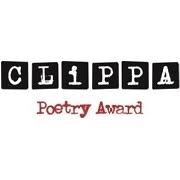
The winner for the CLiPPA (Centre for Literacy in Primary Poetry Award) 2018 has just been announced as Karl Nova for his debut collection Rhythm and Poetry. Established in 2003, the CLiPPA encourages and celebrates outstanding poetry published for children. The 2018 winner and shortlist celebrates and highlights the diversity of voices in the UK poetry scene.
Louise Johns-Shepherd, Chief Executive, CLPE said "CLiPPA is leading an essential movement to build on the current huge popularity of poetry and the growing poetry market to ensure that poetry for children is acknowledged as an essential part of this landscape. The shortlist recognises not just great children's poets but great poets full stop. We want as many people as possible to know about these wonderful works and CLiPPA, the Shadowing Scheme and the resources we produce all come together to make sure that they receive the high profile they deserve."
The full shortlist is:
Rhythm and Poetry by Karl Nova - WINNER
The Rainmaker Danced by John Agard
Rising Stars by Ruth Awolola, Victoria Adukwei Bulley, Abigail Cook, Jay Hulme, Amina Jama
Overheard in a Tower Block by Joseph Coelho
Moonrise by Sarah Crossan
Where Zebras Go by Sue Hardy-Dawson
Grace Nichols, Poet, winner of the first ever CLiPPA and Chair of the CLiPPA 2018 Judges commented: "The judging process involved passionate discussions about which books to shortlist, leading us to come up with a variety of fresh new voices joined by established ones. This shortlist showcases a vibrant selection of poetry books that children will love to explore."
The winner of the 2018 Award will be announced on 22nd June at the National Theatre in London. Schools might also be interested in the free Shadowing Scheme to encourage involvement in the Poetry Award 2018. To support schools to take poetry into the classroom, videos of poets performing from the shortlisted books and talking about their work and high quality teaching resources, are available free of charge to all schools www.clpe.org.uk/poetryline.
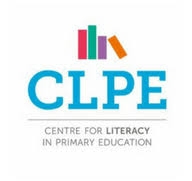
-------------------------------------------------------------
Lovereading4kids Poetry Highlights from Michael Rosen
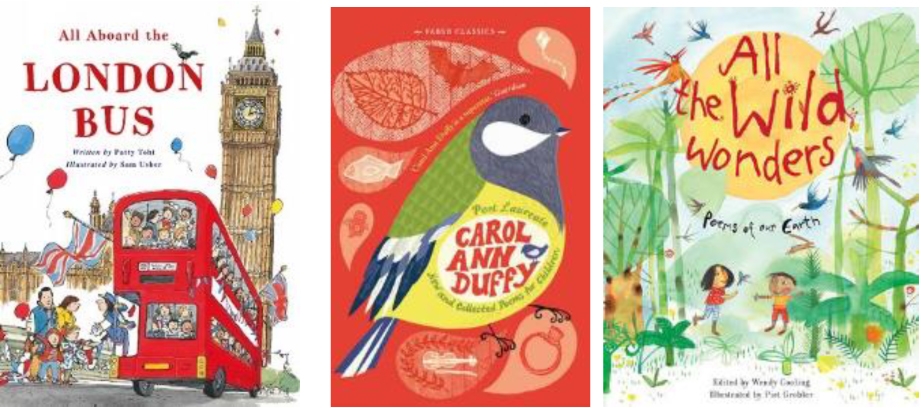
Michael Rosen, the Children's Laureate 2007-2009 on Poetry:
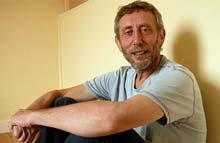
Michael Rosen is a poet and huge supporter of children's poetry has given us his views on poetry - written especially for Lovereading4kids.
FROM MICHAEL ROSEN:
"Poetry is a special way of talking and writing. Poems are often musical, playing with the sounds of language while they tell stories, reveal feelings, make pictures and give us ideas. We all find this pleasurable, but children especially so. I guess that's because for very young children, language often comes at them as something they hear without necessarily understanding it. Then poems come along and hit the same channel, sound, rhythm, rhyme, repetition and all the other tricks in the poet's bag.
Poems can be snapshots: small pictures of a moment, an object, a scene, a feeling. They can be like photos in the family album: a moment frozen which we can look at over and over again and wonder why it matters to us.
Poems are also places where you don't have to say it all, they don't have to tie it up in a neat knot in the way that stories usually do. Poems can end with questions. Poems can end with no answers. Poems can pose problems. And that's fine, because life doesn't usually finish with neat little endings. Life itself is full of questions and problems. Particularly for children.
Poems are great for exploring those fascinating questions once posed by the painter Paul Gauguin: where do we come from? Where are we know? Where are we going? These are questions about what kind of background we have, what kinds of things we believe in and care about, what do we want our lives to look like in the future. Poems often explore these themes. And they do it in personal, direct ways, saying, in a thousand different ways: this is me, this is us, I wonder what kind of person I am, I wonder what's going to happen, and so on. And aren't these questions that children ask over and over again?
Poetry is great for what is almost the opposite of this: pretending we aren't who we say we are. Poets write poems where they pretend to be goddesses, houses, worms, graves, long dead ancestors, aliens. This allows poets to explore feelings they didn't know they had, and in so doing, they invite children to wonder about other lives, other states of existence, other possibilities.
Poetry can be impossible. As we proceed along our logical, sensible lines, relying on gravity to keep our plates on the table, days to follow nights, our blood to flow round our bodies, poems don't have to obey these rules. Whether it's through nonsense (remember the dish who ran way with the spoon?) or through making one thing like another, (perhaps our plates aren't sitting on the table; but rather, the table is tired of carrying the plates) poetry can get us to see the world in strange, new ways and from strange points of view.
Poems are often full of echoes, gathering together hints and memories of other poems, other stories, films, signs, speeches. They gather up and change words. It's as if poems like this point us at the very language we see and hear around us and invite us to stop, think and wonder if the words we are used to are right, honest or worthwhile. For children, this is especially important. If you think for a moment, very nearly all children enter school, using a language that is theirs, only to find that school is full of language that seems to belong to other people. If poetry plays with language and, through its music, invites children to remember and imitate it, this becomes a language that they can possess."
photograph - Graham Turner
... AND A WARNING TO GROWN-UPS FROM THE AUTHORS OF THE JUMBLE BOOK
Poetry is fun. Do not spoil it.
Do not make children read this book for homework. If you do you may be vaporized by a death ray.
Poems are allowed to have rude words because they are literature, so bum to you.
Do not ask children how these poems make them feel. It is a stupid question.
Do not try to analyse these poems: they may self-detonate.
If you can't see the sense of it, that's probably your fault.
Poems do not have to be written in grammatical sentences or have correct
punctuation, so nurch.
Do not tell people off for daydreaming. Poems come from daydreams.
Never make anyone copy out a poem. It spoils it.
Do not make children read these poems aloud in front of the whole class. If you do, you will be kidnapped by aliens and taken to Alpha Centauri and forced to mark Year Six homework for a thousand years.
Issued by the Galactic Authority and dictated by telepathy to Ken Follett, who wrote it all down with no crossings out.
-----------------------------------------------------
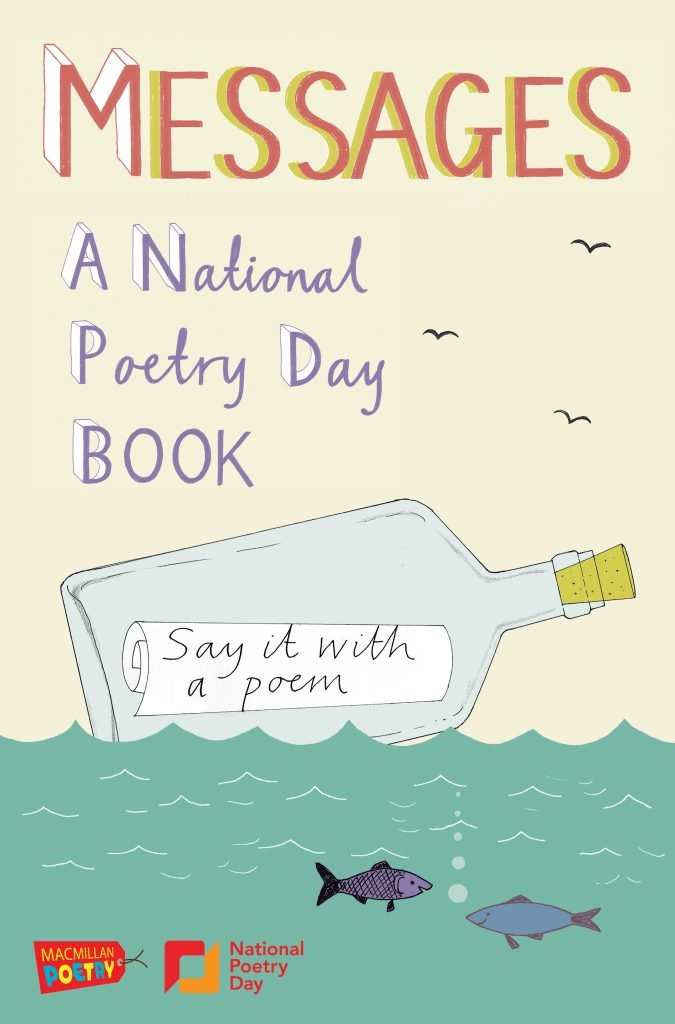 National Poetry Day is held every autumn - you can find out more about this event and download a special free anthology of wonderful poems, both old and new from poets including Brian Moses, Rachel Rooney and Michaela Morgan. Find out more here.
National Poetry Day is held every autumn - you can find out more about this event and download a special free anthology of wonderful poems, both old and new from poets including Brian Moses, Rachel Rooney and Michaela Morgan. Find out more here.
nationalpoetryday.co.uk
Source: https://www.lovereading4kids.co.uk/genre/poe/Poetry.html
0 Response to "Best Poetry Books 2019 Uk"
Post a Comment